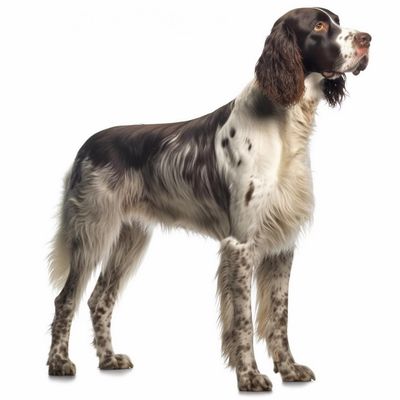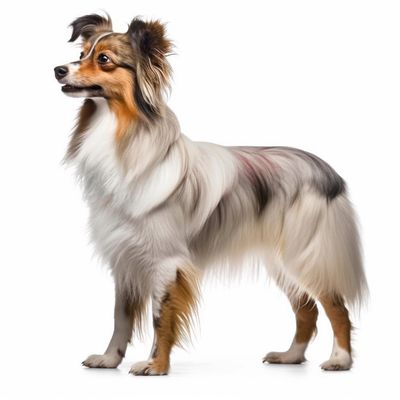Chesapeake Bay Retriever - vs - English Springer Spaniel - vs - Papillon

Chesapeake Bay Retrievers are large dogs, weighing 55-80 lbs, with a height of 21-26 inches.
Chesapeake Bay Retrievers have a high energy level and require regular exercise and mental stimulation.
Chesapeake Bay Retrievers need a significant amount of exercise, including daily walks, runs, and opportunities to swim or retrieve.
Chesapeake Bay Retrievers are intelligent and trainable, but can be stubborn. Consistent, positive reinforcement is essential.
Chesapeake Bay Retrievers are highly intelligent dogs and excel in various dog sports and activities, especially those involving water.
Chesapeake Bay Retrievers can adapt to different living situations, but they need plenty of space and exercise to thrive.
Chesapeake Bay Retrievers are good with children when properly socialized and supervised.
Chesapeake Bay Retrievers can get along well with other pets, especially when raised together.
Chesapeake Bay Retrievers are well-suited for cold climates, thanks to their dense, water-resistant coats.
Chesapeake Bay Retrievers can tolerate hot climates but need to be monitored for signs of overheating during exercise.
Chesapeake Bay Retrievers have a dense coat that sheds moderately, requiring regular brushing to minimize shedding.
Chesapeake Bay Retrievers require regular grooming, including brushing and occasional bathing to keep their coats clean and healthy.
Chesapeake Bay Retrievers bark occasionally, usually only when necessary or provoked.
Chesapeake Bay Retrievers are generally healthy, but regular veterinary checkups and preventative care are still necessary.

English Springer Spaniels are medium-sized dogs, weighing 40-50 lbs, with a height of 19-20 inches.
English Springer Spaniels have a high energy level and require regular exercise to stay happy and healthy.
English Springer Spaniels need a moderate amount of exercise, including daily walks, runs, and interactive play sessions.
English Springer Spaniels are intelligent and eager to please, making them easy to train with positive reinforcement.
English Springer Spaniels are highly intelligent dogs and excel in various dog sports and activities.
English Springer Spaniels can adapt to various living situations but thrive in active households that can provide ample exercise.
English Springer Spaniels are generally good with children when properly socialized and can be energetic playmates.
English Springer Spaniels can get along well with other pets, especially when raised together.
English Springer Spaniels have a double coat and can tolerate cold climates, but they still need proper protection during extreme cold.
English Springer Spaniels can tolerate hot climates, but they need to be monitored for signs of overheating during exercise.
English Springer Spaniels have a double coat and shed moderately, requiring regular brushing to minimize loose hair.
English Springer Spaniels require regular grooming, including brushing, bathing, and trimming to keep their coats clean and healthy.
English Springer Spaniels have average bark tendencies and may bark for various reasons, such as alerting their owners or during playtime.
English Springer Spaniels are generally healthy, but regular veterinary checkups and preventative care are still necessary.

Papillons have a high energy level and enjoy being active, participating in playtime, and exploring their environment.
Papillons need regular exercise, including daily walks and playtime, to maintain their physical and mental well-being.
Papillons are highly trainable dogs, eager to learn and excel in various activities such as obedience, agility, and tracking.
Papillons are highly intelligent dogs, known for their problem-solving abilities and quick learning.
Papillons can adapt well to various living situations, including apartments and larger homes, as long as their exercise needs are met.
Papillons can be good with children, but their small size makes them more susceptible to injury. Supervision and proper handling are important.
Papillons can get along well with other pets, especially when raised together. However, their small size may require caution around larger animals.
Papillons can tolerate colder temperatures, but their small size and thin coat require proper protection during extreme cold.
Papillons can tolerate hot climates but need to be monitored for signs of overheating during exercise.
Papillons have a long, silky coat that sheds moderately and requires regular brushing to prevent tangles and mats.
Papillons require regular grooming, including brushing and occasional bathing, to keep their coats clean and healthy.
Papillons have average bark tendencies and may bark for various reasons, such as alerting their owners or during playtime.
Papillons are generally healthy, but regular veterinary checkups and preventative care are still necessary.



